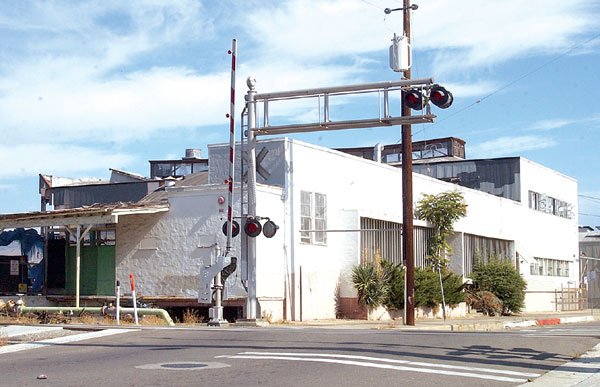GILROY
– One of downtown Gilroy’s most historical – and dilapidated –
buildings could soon be turned into a model commercial and
residential center if the county’s foremost housing agency can pool
together enough money before April 15.
GILROY – One of downtown Gilroy’s most historical – and dilapidated – buildings could soon be turned into a model commercial and residential center if the county’s foremost housing agency can pool together enough money before April 15.
South County Housing and the owner of the old cannery site at Lewis and Railroad streets signed an option-to-buy agreement Thursday, giving the agency six months to study the site, gather funds and draft a project design that would reshape one of Gilroy’s biggest eyesores.
Although plans are only at a conceptual stage, South County Housing would likely turn the vacant building into residential apartments and townhouses with retail shops and professional offices on site, too. With an election just 11 days away, the concept is what many City Council and mayoral candidates have been calling for in Gilroy’s revitalization efforts downtown.
“We’re excited. This is an important project for downtown,” said Dennis Lalor, executive director of South County Housing. “But this is a complicated site. We have a lot of due diligence to do.”
The next step for South County Housing is a threefold process that will include reviewing the site for potential environmental complications, finding sources to fund the purchase and redevelopment of the site and meeting with downtown interests to discuss future uses.
Lalor said that since the site is near a railroad, government funding related to transit-oriented housing would be available for the project. Other state and federal grants for affordable housing will also be sought.
“We’ll go after the usual suspects, but we also hope to find funds we don’t know about yet,” Lalor said.
Whether the 1935 building gets torn down in the redevelopment process is something South County Housing will determine over the next six months.
Lalor said whatever the final design holds, the cannery site will feature affordable housing units.
“Providing affordable housing is our group’s mission,” Lalor said.
South County Housing nearly had a deal to purchase the cannery about five years ago when industrial use was still allowable. Lalor said it fell through when another interested party made a more lucrative offer to the owners.
Lalor said South County Housing has spent the last few months negotiating with JH Investments. South County Housing has eyed the cannery site since June 2002, when Gilroy adopted a new general plan allowing for more mixed-use possibilities.
City Administrator Jay Baksa said South County Housing would have “a lot of flexibility” in planning the site since zoning would allow for commercial and residential uses and a two or three story structure. Baksa noted that an improved cannery at Lewis Street would blend in well with a planned arts and culture center at Seventh Street.
“That sort of frames the whole downtown core area now,” Baksa said.
The option-to-buy agreement is for seven acres of the 12-acre site, Lalor said. The purchase would include the vacant split-level building that burned in the summer of 1999 as well as the warehouse-style industrial shops connected by an enclosed skyway.
Only the “warehouse” section is being used currently by a towing company.
The cannery site was developed first in 1915 by Gennaro Filice and John Perrelli. The site was used to pack tomatoes and eventually 50 varieties of fruits and vegetables. The original building burned in April 1931 and, according to city documents, was rebuilt in 1935.
The assessed value of the property is more than $1.9 million, but according to city documents, purchases of the property made in the 1990s hit $8.2 and $8.8 million.
South County Housing will not divulge the price range it agreed to within the option-to-buy agreement.
Since April 1999, San Jose-based JH Investments has owned the cannery. The company could not be reached for comment.
News of the deal is being greeted warmly by city leaders and other downtown interests.
“This would be another tool we can use to revitalize downtown,” mayoral candidate and incumbent City Councilman Al Pinheiro said. “(Using the cannery for residential and commercial purposes) is an awesome concept.”
Another mayoral candidate, Lupe Arellano, served on City Council when a number of prospective buyers were interested in refurbishing the 202,000-square-foot building and using it for industrial purposes.
Arellano said she is glad the industrial plans appear to have lost out to residential and commercial uses.
“This would be a great shot in the arm,” Arellano said. “My vision for the cannery would be similar to Japantown on Jackson Street (in San Jose).”
Jackson Street has buildings with shops such as delis and restaurants on ground floors with senior, fixed-income and market-rate housing up above.
At least some Lewis Street neighbors are excited to hear about the potential refurbishing of the cannery.
Bill Tran, whose family has owned La Flor de Jalisco market the past 16 years, called it “very good news.”
“There are two reasons it’s good for me,” Tran said. “Workers will come to my store when they are building the apartments. Residents will shop at my store when they live in the apartments.”
South County Housing provides housing for low-income families in Santa Clara, San Benito, Santa Cruz and Monterey counties. It is a private nonprofit organization founded in 1978 in response to the need for affordable housing in Gilroy.















